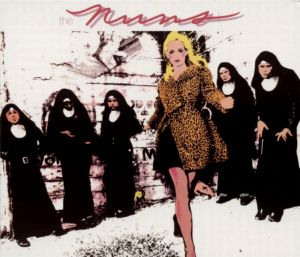
- Format: MP3

Classic debut LP by original San Francisco punks, the Nuns! Although the Nuns, led by Alejandro Escovedo (future Rank & File) and Jennifer Miro (Debbie Harry's West Coast counterpart), ruled the San Francisco punk scene in the late 70s, courted by major labels and selling out nightly shows at San Francisco's hottest clubs, by the time the band broke up at the beginning of 1980 they still had not recorded enough material for a full-length album. Thankfully, however, the band came together once more for the sake of recording this LP before calling it quits for good. This classic slice of '77 punk was recorded in just 20 hours in May 1980 and is the only remaining testimony to their greatness and to what could have been.
San Francisco punks the Nuns are remembered today — if at all — as the first blip on Alejandro Escovedo's march to finding his voice as a singer/songwriter. But that's not fair, because the Nuns had no trouble standing out in a scene that produced such a wealth of distinctive bands. No less than three people share the microphone, though Jennifer Miro — who sounds uncannily like her Blondie counterpart, Deborah Harry — possesses the most appealing voice. Miro's glacial keyboards also carry the main melodic load on tracks like "Suicide Child" — which laments a friend's self-destruction — and &Walkin' the Beat," a salute to city night life. Guitarist Pat Ryan is also a distinctive presence, lending the appropriate quota of muscular barre chord parts on "Media Control," "World War III," and "Child Molester" — which takes an unlikely look at the issue from the offender's eyes ("Where are they gonna put me?"). Old friends also fall out in "Getting Straight," which gives the punk-versus-mainstream wars yet another airing. But it's Miro's barbed charisma that captivates — whether she wants someone to be her "Savage," proud of being "Wild," or simply "Lazy." The latter number is a solo piano ballad on which Miro asserts that falling in love is too bothersome, so she'd rather just watch TV. It's a lovely admission of vulnerability from behind the hardbitten sheen. Where the Nuns could have gone from here is anybody's guess — since this is such a schizophrenic album — but worth revisiting as a minor classic of the late-'70s punk era.